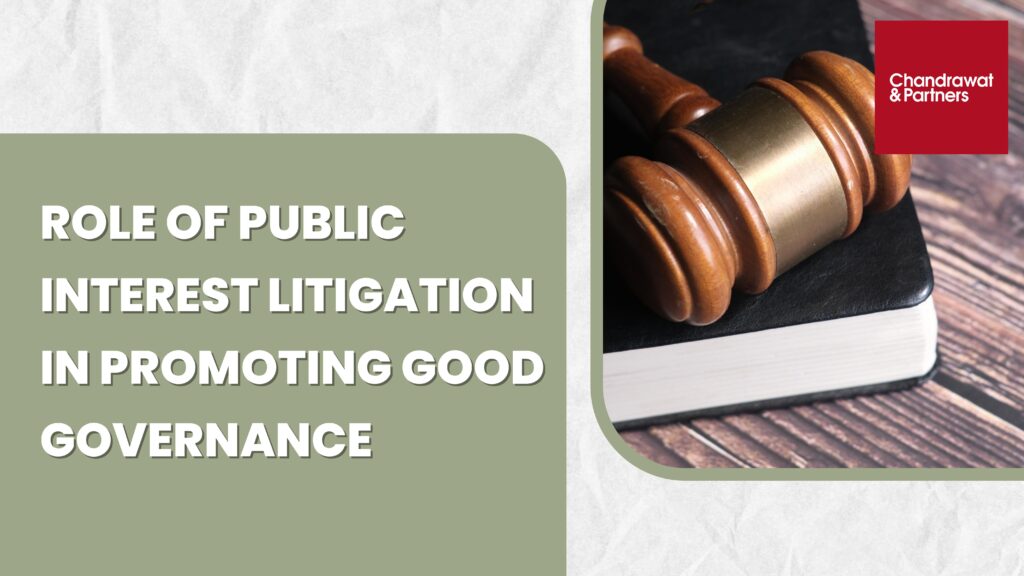Role of Public Interest Litigation in promoting good governance
Overview
Public Interest Litigation (“PIL”) means litigation filed in a court of law, for the protection of public interest. PIL is a component that enables maintenance of rule of law by accelerating the balance between law and justice. The advancement of this authentic instrument demonstrated advantageous for creating a nation like India. PIL has been utilized as a strategy to battle the abominations winning in the general public. The aim of PIL is to give to the common people access to the courts to obtain legal redress. PILs have made it easier for the judiciary to draw up the chief when it is not performing its duties properly.
Good Governance entails effective participation in public policy-making, the prevalence of the rule of law and an independent judiciary, besides a system of institutional checks & balances through horizontal and vertical separation of powers, and effective oversight agencies. While it is the duty of every constitutional functionary, public servant, and every citizen to strive towards securing good governance, the role of the judiciary in securing good governance stems from its assurance to the common man or woman that he or she can continue to look to the courts for the vindication of their rights.
Understanding good governance
Governance refers to all processes of governing, the institutions, processes and practices through which issues of common concern are decided upon and regulated. Good governance adds a normative or evaluative attribute to the process of governing. While there is no internationally agreed definition, it can be said that good governance is the process of measuring how public institutions conduct public affairs and manage public resources and guarantee the realization of human rights in a manner essentially free of abuse and corruption and with due regard for the rule of law.
Good governance signifies the way an administration improves the standard of living of the members of its society by creating and making available the basic amenities of life; providing its people security and the opportunity to do better; instill hope in their heart for a promising future; providing on equal & equitable basis, access to opportunities for personal growth; affording participation and capacity to influence, decision-making in public affairs; sustaining a responsive judicial system which dispenses justice on merits in a fair, and maintaining accountability and honesty in each functionary of the government.
Role of PIL
The important object of PIL is to safeguard the public interest, human rights and protect constitutional and legal rights of disadvantaged and weaker section of the society. PILs are extensions of writ jurisdiction. Therefore, PILs may be filed either before the hon’ble supreme court of India under Article 32 of the Indian Constitution or any high court under Article 226. A PIL can be filed against a state or central government, municipal authorities, but not any private party.
The term ‘Public Interest’ is not capable of precise definition, does not have a rigid meaning and is elastic and takes its colors from the statute in which it occurs, the concept varying with the time and state for society and its needs. Good governance aims to minimize corruption, take into account the opinions of minorities, listen to the voices of the oppressed people in the decision-making process, and respond actively to the needs of the community now and in the future.
Making the government accountable
PILs have created a deterrent effect on corruption by increasing the risk of exposure and punishment for corrupt officials. PILs have acted as a warning to public officials that their actions will be scrutinized and that they will be held accountable for any corrupt activities. the judiciary has been instrumental in expanding the scope of PIL beyond traditional legal issues to matters of policy and governance. PIL has been used to address corruption, environmental degradation, and government accountability, which significantly impact the public. The judiciary has taken a broad view of PIL and has recognized that it can be a potent tool for shaping public policy and governance in the country.
The judicial system of India has the responsibility of Interpreting and protecting the laws. It also acts as the guardian or protector of the fundamental rights of the people. It exercises the power of determining the constitutional validity of all laws. India has some of the most progressive social legislations to be found anywhere in the world whether it be relating to bonded labor, minimum wages, land ceiling, environmental protection, etc. This has made it easier for the courts to haul up the executive when it is not performing its duties in ensuring the rights of the poor as per the law of the land.
In a nutshell
Judicial system is the most important facet of good governance and plays an essential role in ensuring better public governance. The judiciary has played a quintessential role in developing the right jurisprudence by expanding the libertarian and democratic values through judicial pronouncement. The influence of the court is not limited to resolving the final dispute, but also as a frontline guard to constitutional value and the fundamental principle of good governance. The Indian judicial system, through its judicial pronouncement, has contributed to good governance.
Despite the critiques and difficulties, the Indian judiciary has played a critical role in promoting PIL to protect the rights of underprivileged groups of society and the public interest. PIL has helped tackle a number of concerns, including gender justice, access to healthcare and education, environmental protection, and protection of fundamental rights. It has improved policy development, execution, and government accountability and ensured that development benefits reach all facets of society, particularly the impoverished.
For more information or queries, please email us at
[email protected]





